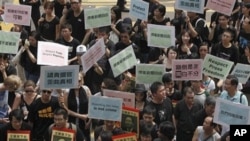An international journalists' rights organization has painted a dark picture of this year's prospect for press freedom in China. The International Federation of Journalists says 2010 saw the government go into overdrive to stave off dissent over a raft of issues from rising inflation to rampant corruption.
The International Federation of Journalists says 2010 was bad year for media freedom in China - and warns the year ahead looks just as bleak.
The federation's annual report says the Communist Party's Central Propaganda Department handed out scores of restrictive orders to rein in the media last year.
Serenade Woo, the federation’s project coordinator for Hong Kong and China, says the noose tightened when Liu Xiaobo was awarded the Nobel Peace Prize last year.
"The central government is still issuing orders covering a range of issues, and they are still extending their hands on the media," said Woo. "At the same time there is no press freedom at all, even though Prime Minister Wen Jiabao said the media has a role as a watchdog in the society."
Last month, newspapers, radio and TV stations and Internet sites were ordered not to mention the difficulty millions of migrant workers were experiencing in buying tickets to return home before the Lunar New Year, which begins Thursday.
And reports about the ongoing uprising in Egypt are being heavily restricted.
The federation says the directives cover a wide spectrum of sensitive topics, including inflation, corruption and official incompetence.
The federation also says Chinese journalists were barred from an area hit by a fatal land side in August and the censors demanded positive reports about an earthquake.
Editors and reporters who cross the line are punished - often on trumped up charges.
Last week, the contract of Chang Ping - one of the mainland's most popular political commentators and the former deputy editor of the Southern Weekly newspaper was terminated. He told Western news outlets he was fired for his critical writing.
The federation reported some small signs of encouragement last year.
Premier Wen Jiabao called on journalists to play a role in overseeing society, and in October, 23 former Communist Party officials issued an open letter calling on the central government to stop censorship.
But in reality little has changed, says Woo, and 2011 is unlikely to see the rules loosened.
"Honestly, I don't think this is likely to be happening in the coming one or two or three years," said Woo. "But I think the easiest thing [for the government] is to stop punishing journalists just because they are doing their jobs."
The federation called on China to keep its promise of gradually relaxing restrictions, which it made before the Beijing Olympics in 2008.
But uprisings in Tibet and Xinjiang since then prompted clamp downs and censors use ever increasing and sophisticated ways to control the media.
Gloomy Year Forecast for Media Censorship in China




